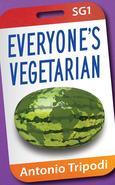Imagine a world where animals never existed. Would Europeans have taken over America without plague-carrying rats? Without disease-spreading mosquitoes, would America have ever stopped using indentured servants instead of malaria-resistant slaves from Africa? If the conquistadors didn't have horses, isn't it possible we might be able to pop into an Aztec pub for a shot of fermented cactus pulp after work And what about all the great minds of history who were inspired by animals? Without birds, the Wright brothers wound up working in I.T. Without a meat industry to expose, Upton Sinclair wound up writing feel-good pabulum for a P.R. department. And without mice to inspire his signature creation, Walt Disney wound up as a bored call-center employee passing the time making notebook doodles. Now imagine if - on July 4, 2020 - all the animals finally arrived. Still dizzy from the Internet revolution, globalization, and a decade of mysterious plant mutations that triggered a worldwide recession, now the people of Earth have to deal with an even bigger disruption. Some people respond with fear and suspicion, running away from moths and crickets like they're alien invaders. Others think their new neighbors are a gift from God and get eaten by crocodiles. And - as always - the masters of the universe ask how all this will affect the bottom line. At the insistence of a chronologically displaced Sacagawea, the cutthroat CEO of a processed food empire teams up with a crafty blue blood whose family has manufactured luxury foods from human remains for generations. Together, the three venture off into this strange new frontier and launch a campaign to accomplish the unthinkable: to make people see these odd new creatures as food. Meanwhile, regular folk are just trying to hold on. Farm workers who used to manually pollinate the plants or aerate the soil find themselves replaced by bees and earthworms. Shipping companies find their inventory gobbled up by rats. At first, it seems peop


